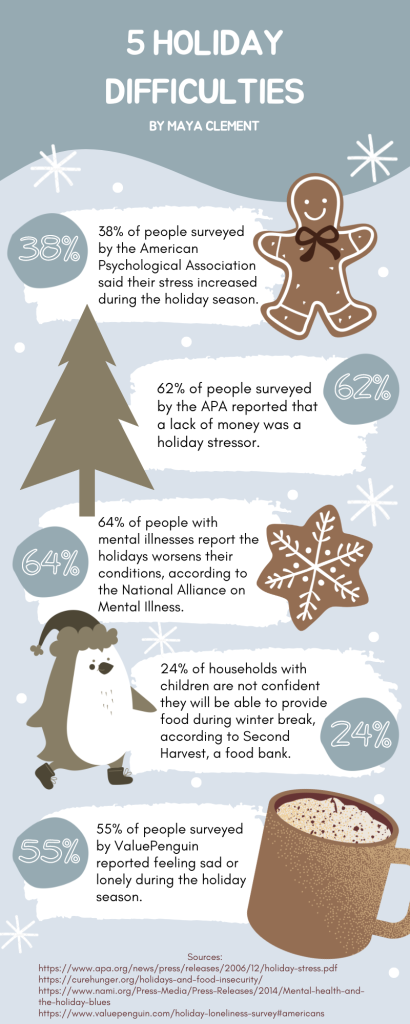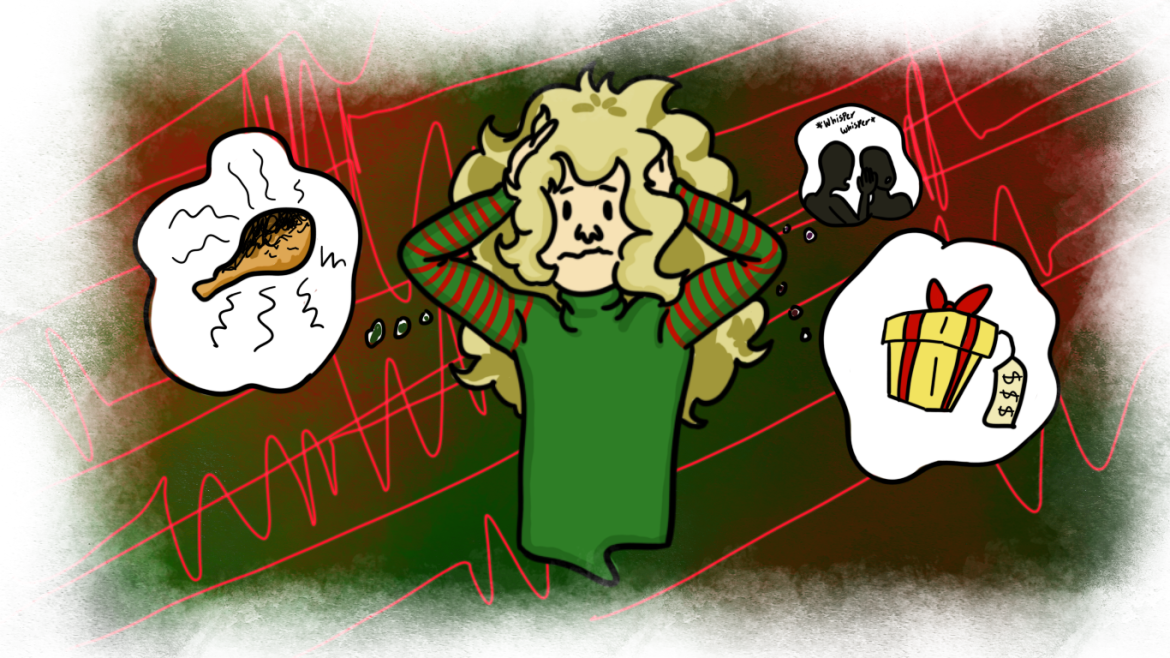A student agonizes over difficulties during winter break. Clarke Central High School teachers and staff have noticed a rise in negative behavior before winter break, which CCHS counselor Heidi Nibbelink attributes to students being aware of the stressors they have to face when not in school. “Sometimes families are going through stressors, whether that’s economic or other kinds of stressors,” Nibbelink said. “I think there’s just a lot of pressure on the holidays for everyone. There’s pressure to get together with people. There’s pressure to have fun, and maybe it’s not necessarily a fun holiday.” Illustration by Antonio Starks
With two and a half weeks off of school and many holidays occurring, winter break is supposed to be a joyful time for all, but this isn’t always the case.
After 17 weeks of long school days full of information, stress from classwork and tests, and the onset of burnout, winter break is supposed to be a time to decompress and relax.
Especially after the COVID-19 pandemic, students are still adjusting to a normal school year, so the holiday season is supposed to be their time where they can do what they want.
Students are conditioned to believe that the two week break is an amazing time where you can celebrate the holidays and spend quality time with your family. It’s the opportunity to watch funny holiday movies, bake cookies, engage with family traditions, read a book, curl up with a blanket by the fireplace and do all of the things students don’t have time to do during the semester.
In reality, this isn’t true for everyone.

An infographic displays different statistics on how the winter holiday season can impact people in negative ways. Students have been conditioned to believe that two and a half weeks off of school is an amazing opportunity to decompress from the school year and spend quality time with family, but this isn’t a reality for everyone. “Students shouldn’t feel the pressure to always be happy during the holidays,” Lead Copy Editor Maya Clement wrote. “Each family is in a different situation over the break and for some CCHS students, that will mean heightened stress instead of relaxing time off.” Infographic by Maya Clement
Waking up for the start of school at 8:45 a.m. every day and being “stuck” there until 3:35 p.m. can seem obnoxious, but having a routine creates a sense of normalcy – one that students don’t always realize they love.
However, a routine isn’t the only thing that school provides students. When students are at school, they have access to important resources that may not be available to them at home.
For example, according to data from Community Eligibility Provision, a free meal service option for low-income schools, 82.82% of all Clarke County School District students are eligible to receive free lunch and breakfast. Those free meals can ease the burden on parents and guardians, especially for those who struggle to provide these resources on their own.
In addition to the loss of meals, students also go almost three weeks without teachers or classmates, many of whom provide each other with emotional support. This can be especially hard on extroverted people who thrive off of others.
“(Students don’t have access to) counselors in the Counseling Office and social workers (during winter break),” CCSD school psychologist Dr. Marcia Page said. “They don’t get to see their friends every single day. They don’t have teachers that they can talk to about certain things.”
This sudden absence of school support can cause students to become more dejected or anxious during or even before the holiday season.
“Every year, sometimes we see an escalation in some kind of (negative) behaviors beforehand as people anticipate being without their supports at school, so you might see some more acting out from students sometimes around that time or the opposite like disengagement,” Clarke Central High School counselor Heidi Nibbelink said.
Students shouldn’t feel the pressure to always be happy during the holidays. Each family is in a different situation over the break and for some CCHS students, that will mean heightened stress instead of relaxing time off.
While the holiday season is often perceived as an exciting and cheerful time, reality isn’t always so kind. Having this perception of necessary happiness can really make someone feel worse and lead to a decline in their mental health simply because they aren’t happy all of the time.
“Sometimes families are going through stressors, whether that’s economic or other kinds of stressors,” Nibbelink said. “I think there’s just a lot of pressure on the holidays for everyone. There’s pressure to get together with people. There’s pressure to have fun, and maybe it’s not necessarily a fun holiday. People are doing holidays, for the first time, having lost loved ones during the year.”
While the holiday season can be difficult, students who struggle to access resources should reach out to their school counselor or CCHS social worker Ashley Simpson-Haley. In addition to that, students can reach out to people they trust and be in communication with them so they still have a sense of community.
Students are conditioned to believe that the two week break is an amazing time where you can celebrate the holidays and spend quality time with your family.
Having a plan in place before entering the holiday season might make students feel more safe which could prevent a decline in mental health.
There are so many special circumstances surrounding the long holiday break which can take a serious toll on one’s mental health. But while planning ahead for challenges is fine, so is accepting that it’s okay to not always be okay.
In the end, students shouldn’t feel the pressure that is inadvertently placed on them by always hearing that winter break is a time to be released from their educational responsibilities and decompress from everything they experienced during the semester. It’s okay to not have a picture-perfect holiday season. It’s okay for winter break to not fit society’s mold.
